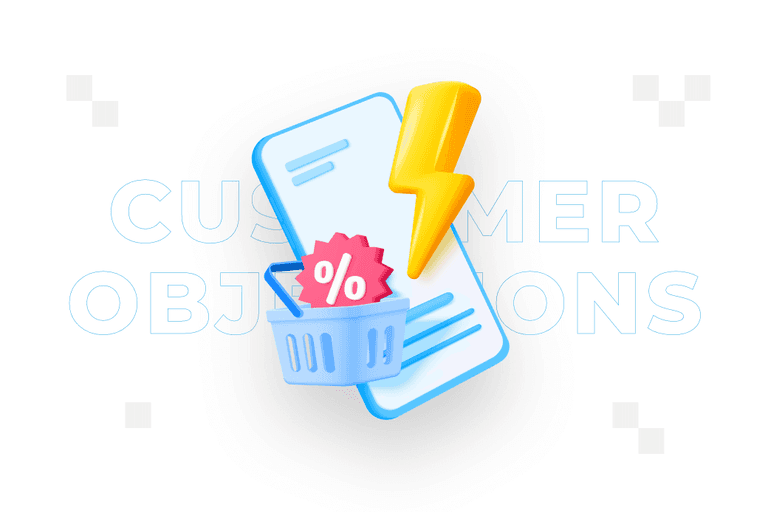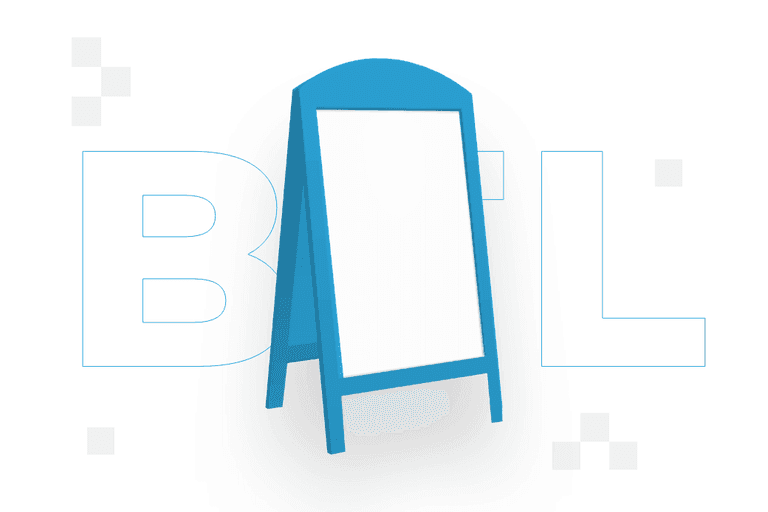Table of contents
- What is a sales objection?
- Types of sales objections
- Overcoming customer objections – what does it mean in practice?
- Why is it important to overcome customer objections?
- How do you deal with customer objections?
- Effective techniques for overcoming customer objections
- Popular customer objections and effective ways to overcome them
- Why is it important to overcome customer objections?

Customer objections? Techniques for overcoming objections

Almost every potential customer has reservations about the service or product being offered. If they did not, the interested party would immediately accept the offer. It is therefore a natural step in the sales process to deal with customer objections. When objections arise, use them as an opportunity to re-emphasise the value of the product. By no means give up – customer objections and doubts can be resolved effectively. In the following article, we will tell you how to do this!
What is a sales objection?
Sales customer objections are all kinds of concerns and objections raised by potential buyers during the sales process in progress. They refer to a barrier that makes it difficult for them to purchase the offered product or use the proposed service. What do such barriers stem from?
When answering the question, where do the customer’s objections come from, attention should be paid first of all to the lack of certain capabilities of the buyer. These include limited resources, insufficient interest and doubts about the need to purchase your product at a particular time. Furthermore, if customer objections arise during the sales process, this is also an important signal for you as a salesperson or entrepreneur – you probably need to carefully analyse the various stages of the sale – perhaps one of them needs improvement.
Customer objections are definitely one of the more difficult and frustrating elements in the sales process. Keep in mind, however, that they are absolutely not blind spots, preventing you from selling. On the contrary – you can effectively beat a customer objection and turn their doubts about your product into real interest in buying it.
Types of sales objections
A successful sale is possible when certain conditions are met. First and foremost, the right price of the product will persuade the customer to make a purchase decision. In addition, it is important that you have the authority to make the potential customer trust you and decide to buy the product. It is also extremely important that the product offer reaches the customer in a timely manner and fully meets their expectations.
The above-mentioned factors influencing effective sales are referred to as BANT (Budget, Authority, Need and Timing). The customer objections discussed in this article, on the other hand, usually arise when the selected sales factors are not met. The types of sales objections will therefore be the inverse of BANT. These include:
Insufficient budget
The statement: “the product is too expensive” is one of the most common customer objections. Why? This situation is due to the fact that every purchase involves a certain amount of financial risk that the customer has to bear when he or she decides to buy a chosen product or use a certain service. How to deal with this?
Since the customer is not sure whether the price of the product is adequate, you must reassure them that the value of the goods will compensate for the financial risk they are incurring. In this case, it is worth using the risk and reward mechanism. It is based on showing the potential customer that the risk he takes by choosing your service is smaller in comparison to the reward (benefit) he gains from the service. In other words, the benefits associated with the purchase of your product will fully justify the costs incurred.
Lack of confidence
Among customers’ objections, there is often a doubt related to the fact that they do not know your company. Instead, people generally do business with those entrepreneurs they know and like. How do you deal with this?
In this case, consider whether the potential customer has really never heard anything about the services or products you offer. In fact, it is very possible that he or she has come across the content you publish, for example. Do thorough research and refer to things that the potential customer may already know about you. This will help you build his trust and encourage him to buy.
In a situation where the customer is actually unfamiliar with your company, use what you have already achieved. Tell him about successful projects and a circle of satisfied customers. This will make the customer feel that you are worth trusting and using the services you offer.
Lack of demand
“I don’t know how this can be useful to me”. If a customer says outright that they don’t know how to use your product and why they should use it, this is a great opportunity to tell them about the functionality of the services you offer.
Many entrepreneurs consider this type of customer objection to be a strong objection. In reality, you can use such objections to get to know your target audience better. Ask the customer open-ended questions about exactly what he needs and what his expectations are. Then prove to them that your product meets them – provide the caller with all the necessary information – so as to remove any doubt.
Inappropriate timing
“It’s not important to me at the moment”. If the customer feels that, for some reason, your service is not needed at the moment, try to find out why. You may indeed have chosen the wrong moment. In that case, listen carefully to the potential customer and offer him or her another time to talk. However, it is possible that the type of objection you describe is just an excuse. Analyse the situation and act accordingly – try to arrange an interview at another time or stop offering the product to someone who is not and will not be interested in it.
Overcoming customer objections – what does it mean in practice?
Overcoming customer objections is when a potential customer voices their concerns about a particular product or service and the salesperson finds a solution that turns their doubts into a purchase. Overcoming the customer’s objections is therefore a reaction by the salesperson that effectively changes the buyer’s attitude and contributes to the completion of the transaction.
It is often the case that, once objections are raised, sellers start arguing with their customers. Such an attitude, however, cannot be defined as the overcoming of objections. In fact, it leads to the potential customer becoming confident in their position and starting to withdraw. In turn, the salesperson destroys the relationship and trust that has been built up to that point.
Remember not to tell the customer that they are wrong. It is also a mistake to insist that they should think otherwise. Approach the matter calmly and present such arguments that will make the customer change his position of his own accord. And don’t forget the difference between objections and a lack of interest in your product. Differentiate between a message like “I’m interested in your product, but I’m not sure if…” from “I don’t want to talk to you and I’m not interested in your product”.
Why is it important to overcome customer objections?
Customer objections are a natural part of selling. For this reason, it is so important to deal with them effectively. After all, there is nothing worse than a situation in which a customer’s objections are left on their own, without any response and without any attempts to overcome them. Customer objections should be calmly received and explained – this attitude will pay off in real business terms.
You can easily anticipate some customer objections. To do this, ask yourself the following questions:
- Is there an element of the product that raises concerns?
- Is there anything that would stop you from buying your chosen product?
- Are you confident that the product will meet the customer’s expectations?
- What are your conclusions, does anything need to be optimised?
How do you deal with customer objections?
Dealing with customer objections is an integral and somewhat annoying part of the sales process. To be effective, the salesperson needs to master certain skills and carry out actions that will help them to be more effective. These include:
Situational awareness
There is, of course, no single proven method to dispose of all possible customer objections. But one thing is certain – you need to figure out what stage of the sale you are at, the nature of the transaction you want to complete and the needs of your potential customer.
Situational awareness, i.e. knowing and understanding the circumstances that cause customer objections, is the basis for going forward and successfully removing doubts. For this reason, ensure that you are constantly up to date and know where you and your potential customer stand.
Extensive research
Thorough research naturally goes hand in hand with situational awareness. This is because in order to achieve it, you need to know your client and the nature of their business well.
It is worth considering what problems and challenges their business is facing. Analyse your previous clients for this purpose. Perhaps one of the entrepreneurs you have worked with before was running a similar business? Find out what his or her business struggled with and use this experience to help your new client.
If your potential client is not the owner of the business, but an individual who works there, think about what their decision-making capabilities are, what they struggle with on a day-to-day basis and what aspects of the business they have real influence over. All the information you gain will be a valuable aid to ensure that you can effectively beat the customer’s objections.
Empathy
As we have highlighted many times, customer objections are a completely normal stage of the sales process. What’s more, in many cases, they reveal the weaker points of the sales offer, which cause the customer’s doubts and require improvement. For this reason, difficult though it may be, avoid showing frustration or anger. A lack of patience and control of emotions can cause a potential customer to back off and you will lose the opportunity to complete a valuable transaction for your company.
The basis of a successful sales process is the empathy you show your customers. Don’t sell products for profit alone. Find out the real customer needs and help them precisely with the services or products you offer. Show your target group that you really care about them. In this way, you will build a valuable customer base that will give you the respect and trust you deserve.
Thoughtful open questions
You will also be able to overcome customer objections with well-chosen questions, asked in an open-ended format. You can ask, for example, what functionalities the product should be equipped with in order to meet the customer’s needs and expectations to the greatest extent possible. In this way, you will know the real requirements of your audience and will be able to structure your offer so that it is interesting to them.
Remember to avoid closed questions that will only generate yes or no answers. By doing so, you will be doing yourself a disservice and limiting the options available to you. This is because you will take away the space for the customer to share their doubts and thoughts about the product with you.
Effective techniques for overcoming customer objections
When dealing with customer objections, the most important thing is to have the right sales attitude. Ensure that you control your emotions and respond calmly to customer queries. How else can you deal with customer objections?
Active listening
Above all, focus on what the customer wants to tell you. Don’t take his or her words personally and don’t analyse them in the context of the allegations made. Such an attitude will make you start to treat your interlocutor as the enemy, which will arouse negative emotions and disrupt rational thinking. Also avoid responding aggressively to every sentence your client says. Instead, learn to listen and understand him or her.
Active listening also means showing the customer that you really care about what they are saying to you. So every now and then, nod your head and give your interlocutor the space to voice all their doubts about your proposed services.
Reiterating the client’s concerns
Linked to active listening is also repeating the client’s objections. After he or she has expressed his or her objections, collect the content you have heard into a so-called ‘pill’ and briefly repeat what you have just heard. This will give you confidence that you have understood the customer’s message correctly, and they will see that you have listened carefully to their concerns and genuinely want to help them.
Show that you are on the customer’s side
It will also be important to demonstrate that you are keeping your interlocutor’s side of the story. This is not, of course, about a situation in which you start recommending a competitor or speak unflatteringly about your company. It is about showing empathy and understanding. So what can you say to the customer?
First and foremost, say that you understand his or her concerns and doubts. You can mention that these often occur in similar situations and are quite normal. Point out, however, that you and your team specialise in the field in question and will certainly do your best to ensure that the client’s potential fears do not actually materialise.
Follow-up questions
When hearing the customer’s objections, try to keep the conversation going and ensure that it has a natural tone. If the customer sees that your behaviour has suddenly become nervous, there is a good chance that they will withdraw. So how do you sustain the conversation when the customer’s objections arise?
Complementary open-ended questions will be an ideal way. You can ask, for example, what the customer’s expectations are or what product functionality would affect their satisfaction and why this particular feature is important to them. Avoid questions that force a short yes or no answer. If you do, you will shorten the conversation and miss out on information that is valuable for optimising your product or service.
Social proof and customer objections
Social proof also plays an important role in overcoming customer objections. If you want to convince the caller of your product, show them the successes you have achieved with your product. To do this, use the stories of your previous customers, which also illustrate the principle and functionality of your products.
A specific date and time for the follow-up
In a situation where your customer wants to think things over and talk at another time, give them time to consider the offer. However, make sure you set a specific date and time for the follow-up call. Choose it in such a way that the customer has time to think about what you’ve offered them and, at the same time, doesn’t forget about your product and the offer you’ve made. Also make it clear that they can call you in the meantime if they have any questions, related to your product or service. This will show that you are organised and care about communicating with the caller.
Anticipating customer objections
In order to deal effectively with customer objections, you have to anticipate them in the first place. If you are prepared for something, it will be much more difficult to be thrown off balance and provoke unprofessional behaviour that could result in losing a customer.
Analyse the most common objections that customers make and then prepare possible responses that you can give in the future. If nothing surprises you and you listen patiently to the customer while showing understanding of his or her concerns, he or she will certainly allow you to present possible solutions.
It is good practice for salespeople to role-play possible customer behaviours and objections. Take turns with other team members to ask each other the most common questions of a specific target group and practise giving correct and calm answers.
Bonding Process: LAER
A proven and highly effective method for dealing with customer objections, which also takes into account some of the ways mentioned above, is the so-called Bonding Process: LAER, developed by Carew International. It consists of four elements: Listen (listen), Acknowledge (understand), Explore (explore) and Respond (respond).
Initially, you should listen to your customer. This will help you know what specifically raises their objections or concerns.
The next step is understanding, which in part refers to the active listening mentioned above. Show your customer that you understand what they are saying to you. Sometimes an affirmative nod or a repetition of part of a sentence that your interlocutor has just said is enough. This way, he will see that you are interested in what he has to say and there is a good chance that his problem will be solved.
After listening to the customer, it will be necessary to verify (investigate) the situation and its causes. Take a look at the problem described – perhaps an element of the product really needs to be improved, or perhaps a more detailed description is all that is needed.
Finally, it’s time to respond. Meet with the customer and present them with a revised offer or talk to them about previous concerns. Explain in detail the problem they previously approached you with. By doing so, you will make the potential buyer see that they can report to you if they have any difficulties.
The LAER method (which is part of the Bonding Process) is a very effective way of beating back customer objections. It allows you to resolve issues that arise while building a good relationship with the customer.
Popular customer objections and effective ways to overcome them
Statistics show that 60 per cent of customers first say “no” four times before saying “yes”. Refusals and objections are therefore an everyday reality for every salesperson. As a result, it is worthwhile to prepare oneself adequately in order to dispel the customer’s doubts and thus bring the transaction to a conclusion.
The specific objections will, of course, vary depending on the industry and target group. However, there are some typical objections that often arise during sales discussions. Ideally, of course, you should create your own individual list of possible questions and answers. Sometimes, however, it is difficult to pinpoint and arrange thoughts accurately. For this reason, we have compiled a list of the most common customer objections and effective ways to address them. Here it is:
It’s too expensive
The most common problem salespeople encounter is that a product is too expensive. Be sure not to take the cost to the customer deciding on your service as the starting point of your actions. Then, in the eyes of the customer, you will only be an intermediary in the transaction. So, how do you respond to objections relating to the price of the product? A possible message would be the following statement: “I understand that the price seems too high. However, this is due to the valuable functionality of the product, which can solve your problem”.
I don’t have the money
As a salesperson, you may also encounter a situation where your potential customer’s budget is not aligned with the costs involved in using your services. In this case, match it with a solution that will enable you to work together fruitfully. What answer can you give? Here is an example: “I perfectly understand that you cannot afford the service at the moment…. However, I can make you another offer that will fit your budget.”
I cannot afford it this month
This is another variant of the objection: I don’t have the money. If your potential client is genuinely interested in using the services you are offering them, try to find out whether their financial problems are temporary and whether they will want to work with you once they are over. To do this, you can ask: “Is there any chance of the situation improving in the next month? Can we arrange a follow-up call?”.
I need to spend money on something else
It may also be the case that your potential customer wants to spend the money he has on something else. In that case, you need to convince them that it is your services that will provide them with the best solution to a particular problem or meet their expectations to the greatest extent. Use your track record and the stories of previous clients to do this. You can use the following message: “Our company some time ago serviced a client who was struggling with…. The solutions we provided allowed him to achieve excellent results’.
I don’t want to sign a contract
Reluctance to sign a contract may be due to two reasons: the potential client is unsure of the service you are providing or is afraid to commit for a long time for financial reasons. First of all, therefore, verify what is causing their objections. Then see what you can do to turn objections into an opportunity to complete the transaction. Perhaps your company can offer the customer a shorter settlement period, such as one month. How do you respond to an objection related to a long-term contract? You could say: ‘I perfectly understand your concerns about a long-term contract. We can agree on individual terms and conditions to suit your needs and capabilities’.
I already work with someone else
It can seem very difficult, if not impossible, to beat the objections of a potential client who is already working with another company. In reality, the situation is quite different. This is because in this case, your competitors have done much of the work for you. How is this possible?
The customer, who is already working with another company, already knows exactly what he needs and what features a certain product should have. He also already has an idea of how the buyer-seller relationship should work. Your task is therefore only to find out where the customer’s objections to the competition come from – find out what they lack, what they would like to improve, what solutions would increase their satisfaction with the service. To do this, you can ask: “For what reason did you choose …? What product features are satisfactory and what would you like to improve? Let me explain how my service is different.”
I have a contract with a competitor
Among the customer’s objections, there may also be an argument concerning a long-term contract signed with a competitor. The premature termination of such a document usually entails some financial loss. When a customer says they would like to work with you, but are concerned about the costs associated with early termination, try to help them. Analyse the options available – perhaps a discount that at least partially offsets the client’s costs might be viable? Perhaps an overall cost breakdown after engaging with your company will ultimately give him a profit? During the conversation, ask: ‘How is your relationship with …? Perhaps I can offer a discount to offset the costs involved in doing business with our company?”.
I can buy it cheaper elsewhere
If a customer themselves tells you that a competitor offers cheaper products, you have two options. Firstly, you can try to reduce the price by charging a discount. The other option is to point out those features of your product that make it stand out from the competition (which also makes it more expensive). Say: “I understand that the price seems high. However, look at how my product is different from…’. Think about which solution will give you the most satisfaction. My service will provide you with a lot of functionality, which will have a satisfying effect on your business’.
I am satisfied with the competition
A popular customer objection is also the statement: I am satisfied with the competition. What should you do in such a case? First of all, stay calm. Ask what influences your customer’s satisfaction and analyse your competitor’s weaknesses to build on when creating your own commercial offer. Example answer: “What product elements most affect your satisfaction? I would be happy to learn more about this and tell you how our product differs.”
Competitors say about your service that….
These types of customer objections require a strong response. According to Jeff Hoffman – creator of Your Sales MBA® – it’s best to say ‘that’s not true’ straight away and pause. According to Hoffman, 90% of potential buyers will be satisfied with such an answer. Why? It will make the customer feel that you know what you are saying and can be trusted on the subject. Remember to make a strong argument: “Our production takes place in …, not in …. I can provide a map showing the locations of our factories and distribution routes’.
I am not authorised to sign the contract
In this situation, simply say: “No problem. Please redirect me to an authorised person with whom I can discuss the details, regarding the purchase”.
I can’t sell it internally
Just because a potential customer can’t sell your product in-house doesn’t mean you can’t do it. Find out what objections your prospect might face and help them resolve them: “What objections do you think might arise? Is there anything I can do to help you prepare the arguments you will use in the business meeting?”.
The decision-maker is not convinced of the purchase
Sometimes there are situations where you simply have to give up. If you continually fail to convince the decision-maker of the value of the product and its purchase – give up. Don’t waste any more time trying to prove the quality of the service and that it is worth going for. Say: “It’s a pity you couldn’t convince … If things change, please contact me”.
They buy us out
There are times when your potential client’s company goes bust. Usually there is nothing you can do about it. Remain calm and classy and say: “I understand. Thank you very much for your time. If you ever need my product/service, don’t hesitate to give me a call.”
Too much going on at the moment
This is a very common excuse designed to sell the salesperson. So make sure that your potential customer really doesn’t have time, or that it is just a way to make a quick end of the conversation. If he or she gives you a legitimate answer, offer another specific date and time for the call: “I understand perfectly. What are your priorities? We can arrange another date – when there is a gap in your calendar.”
I belong to a buying group
Sometimes it is the case that customers join so-called buying groups and purchase together, thus obtaining much lower, wholesale prices for products. If you do not belong to this type of supplier, a potential customer is unlikely to be interested in your services – it will not be economical for them. However, you can ask about the terms of membership and the possibility of joining a supplier group. Ask: ‘Are there any restrictions in the buying group, specifying who you can buy products from? What price does it currently have…? What type of companies are in the supplier group?”.
I have never heard of your company
Treat this type of objection, which comes up in the sales process, as a request for more information. If the customer says they have not heard of you, give them specifics, e.g. tell them who your services have already helped: “We are a marketing company that helps diverse businesses achieve satisfactory sales results. Our clients include …”.
I’m doing great
How do you respond to such customer objections? First of all, don’t give up. Try to find out more about the industry in question and the goals your interlocutor wants to achieve – perhaps something has not yet been realised and they could use your help. Ask: “What are your goals? How many of them have you already achieved?”.
I don’t have a business plan
When hearing such an objection, bear in mind that the potential client may not be interested in your service or may not realise that they have a problem that you can solve. Investigate the situation and, if the caller is unaware, say: “That’s interesting. What solutions are you currently using? Perhaps I can suggest something that will increase your results”.
It’s not important now
You may encounter this type of objection when a potential customer tries to justify his own inaction on an existing problem. Make him tell you a little more about the issue and try to awaken in him the desire to act: “Tell me more about it. If it is not important to you, then what are your priorities that guide your action?”.
I don’t know what your product can give me
This is another ‘objection’ that is really just a request for more information. So ask about the goals and challenges the potential customer is facing and explain how your product can help: “What specific challenges do you face? Perhaps my product will provide you with the ideal solutions to achieve your pre-set goal”.
I don’t understand your product
Such customer objections can be a signal that the functionality of your product is not entirely clear. Therefore, verify your service and think about what you can do to ensure that your customers are not confused about how your product works. Instead, in your conversation, offer to put them in touch with a technician or engineer who can help them understand the product’s functionality: “What aspects exactly are unclear? I would be happy to connect you with a technician who can clarify any doubts you may have’.
I have heard complaints about your service
Panto mail can both influence your success and your failure. If a customer says he has heard complaints about your product or service, don’t react nervously and deny his words. Instead, thank him or her for the feedback and say that you will verify it: “Thank you for sharing your valuable opinion regarding our company. I will forward it to the relevant department. I’d like to take this opportunity to ask if you’d be interested in tips on…?”.
I am unable to implement your product
Depending on the type of service you offer, it may be the case that using your service or product requires, for example, the hiring of new staff. Not every potential customer can afford this. Therefore, verify the situation – it may be that the selected person will indeed not be able to use the service – in which case you should exclude them from your target group. However, try to find out more about the situation – you may find the right solution: “I understand your concerns perfectly. I am very keen to ensure that my product adds value to your business, not takes it away. What problems are you currently facing? I would be happy to tell you how my product can solve some of them.”
Your product is too complex
In this case, you need to find out if it is about specific features of your product or if the whole service is beyond your potential customer. If it is only about selected functionalities – let your caller know that they can use your technical support at any time: “Our customer service team is at your disposal. If necessary, we are happy to help”.
You don’t understand my problems
Customer objections also arise through communication problems. Sometimes it is enough to swap the order of words or rephrase them incorrectly to create a misunderstanding. So make sure you know what your interlocutor is talking about: “Let me repeat your doubts. Do you mean …?”.
You don’t understand my business
When operating in your chosen industry, make sure you know as much as possible about it. Remember also that we are all only human – mistakes happen to all of us. If you do, don’t be afraid to admit it – potential customers will then see that you are sincere and will appreciate it: “I’m sorry, I mistakenly assumed that…. Can you tell me more about…?”.
You are not offering what I need
If you come across an objection like this, try offering a potential customer a complementary service that provides a comprehensive answer to their needs: “We can combine product X and Y. Then we will have the perfect solution that will undoubtedly meet your needs.”
I don’t want to change anything
If the client thinks he is doing great, verify this and see what challenges he faces on a daily basis (everyone has some). In conversation, appreciate what he does and ask how he solves problems: “It’s great that you’re doing so well. How do you deal with…?”. Show the interviewee that you want to know as much as you can about him and use the information you get when formulating your business offer.
I don’t see any opportunities for growth
In this situation, the customer may be encouraged to make a decision by concrete examples of your company’s successes. So organise a meeting where you illustrate why working with your company is profitable and developmental in the long run: “Let’s arrange a date convenient for you. At the meeting, I’ll show case studies so you can see how my solutions can help you succeed.”
It’s just a fad
Such customer objections usually arise when the product or service is completely new. A few years ago, for example, those specialising in social media communication were met with reluctance. At the time, few people believed that social media were necessary – today they are, among other things, an indispensable part of marketing strategy. Of course, it will be much easier if you already have a bunch of satisfied customers – then it is enough to show the interviewer the results you already have. Otherwise, show how your product works: “Let’s arrange a meeting where I demonstrate the principles of my product and talk about how it can help your business.”
Your product doesn’t fit with us
Such objections will mainly be held by those entrepreneurs who are very attached to their current solutions. Overcoming the customer’s objections in this case will involve gathering information, regarding current solutions, and proving the innovation and functionality of the proposed product: “What tools are you currently using? How do they help you achieve your goal? I can offer something that will improve your results’.
I don’t have time for this
Implementing a new product is often associated with huge amounts of time. If, in fact, the customer feels that introducing your service will be time-consuming, try to prove to them that they will ultimately gain a lot from it anyway. You can beat back the customer’s objections about lack of time as follows: “I understand your concerns. So how long does it take you to complete a task…? With the help of our product you will do it x times faster”.
Disconnected call
An interrupted call happens to every salesperson. Perhaps you have come across the wrong person in the company? Try contacting another representative. You can also wait a few moments and call the same person back, saying: “It looks like the call was interrupted. Can I take a few minutes?”
I’m busy
Most entrepreneurs don’t have time for long conversations with salespeople. So what will it take to beat back the objections of a customer who says he is busy? First of all, show him understanding and point out that you only want to take a few moments today: “I don’t want to take up too much of your time. Can we have a short conversation about the problems you face on a daily basis? I think my product will help you solve them.”
I’m not interested
The first conversation with a customer belonging to your target group cannot really show real interest or lack thereof. Overcoming the customer’s objections in this situation will consist of proposing a date for a follow-up call, where you will talk more about the product: “I understand your concerns. Let me tell you more about my product at another time. In the meantime, I can send you materials to help you learn more about our services.”
Send me information
When you hear a customer objection like this, know that it could be both an attempt to sell you and a request for more information. So ask: “What exactly would you like to know about? I’d be happy to send you the relevant material.”
Call me at another time
To overcome objections of this type is first and foremost to set a specific date and time for your next call. Don’t allow the conversation to be put on hold without setting clear details for the next meeting. You can ask: “What other date would be appropriate? Please provide a specific date and time.”
Where do you get your information about me?
Among your clients’ objections, there may also be objections about where you obtained their contact information from. A good solution in this case would be to refer to company websites, where employee details are often listed – but make sure that your caller’s number is actually there. Say: “I came across your company’s website during my research and I think my product will be extremely useful to you.
I hate you
Beating back objections based on the customer’s attitude towards you will involve trying to pass it on to someone else. Sometimes agreement simply won’t be possible – in which case it may be better to ‘hand over’ the customer to a colleague – he or she may be able to communicate successively. If you see a caller’s unfriendly attitude towards your person, say: “I’m sorry you feel that way. May I pass on your number to a colleague? Perhaps you can establish an effective working relationship”.
I am not responsible for making decisions
If the caller says they are not the right person to make decisions, ask them to contact the decision maker. Don’t give up – you are actually in a very good position. Ask the interviewee to give, for example, the CEO an outline of the case you want to contact him/her about: “Thank you for the information. Who can I speak to then? Could you introduce me and the case I’m calling about?”.
Does your product have features…
If the customer himself asks about the possible functionalities of the product this means that he is genuinely interested in it. Take advantage of this and set up a meeting where you explain in detail the features of the product you are offering: “I’m glad this question came up. I think it would be a good idea to set up a date and time for a meeting to discuss all the details as they relate to the product.”
We need to translate this
These types of customer objections usually arise when they are not interested in the product and don’t know how to say no to you. To find out what your caller’s true intentions are, say: “Of course, we can arrange another time to meet or talk. However, I’m afraid you’re not entirely interested in my product. Am I right?”.
Evasive answers
If your prospect keeps giving vague and indecisive answers, it may be that they are not empowered to make a decision. An effective way to validate the situation and nail down objections of this type would be to ask: ‘Have you bought a product like this before? Who will be responsible for the purchase? Should someone else be involved in this conversation?”.
Why is it important to overcome customer objections?
Beating down customer objections is an integral part of selling. Remember that not every objection is a sales obstacle. On the contrary, many objections are an opportunity to tell more about your product, gain valuable customer and competitor information and verify what parts of your product need improvement. Overcoming customer objections can therefore help you make a successful sale now and later – this will be possible by analysing your competitors, correctly defining your target group and adapting your product’s functionality to the needs of potential customers.
Contact form
Develop your brand
Rate content:
You may be interested in:




